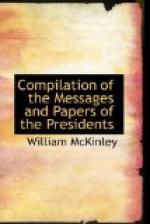Following the further provision of the joint resolution, I appointed the Hons. Shelby M. Cullom, of Illinois, John T. Morgan, of Alabama, Robert R. Hitt, of Illinois, Sanford B. Dole, of Hawaii, and Walter F. Frear, of Hawaii, as commissioners to confer and recommend to Congress such legislation concerning the Hawaiian Islands as they should deem necessary or proper. The commissioners having fulfilled the mission confided to them, their report will be laid before you at an early day. It is believed that their recommendations will have the earnest consideration due to the magnitude of the responsibility resting upon you to give such shape to the relationship of those mid-Pacific lands to our home Union as will benefit both in the highest degree, realizing the aspirations of the community that has cast its lot with us and elected to share our political heritage, while at the same time justifying the foresight of those who for three-quarters of a century have looked to the assimilation of Hawaii as a natural and inevitable consummation, in harmony with our needs and in fulfillment of our cherished traditions.
The questions heretofore pending between Hawaii and Japan growing out of the alleged mistreatment of Japanese treaty immigrants were, I am pleased to say, adjusted before the act of transfer by the payment of a reasonable indemnity to the Government of Japan.
Under the provisions of the joint resolution, the existing customs relations of the Hawaiian Islands with the United States and with other countries remain unchanged until legislation shall otherwise provide. The consuls of Hawaii here and in foreign countries continue to fulfill their commercial agencies, while the United States consulate at Honolulu is maintained for all appropriate services pertaining to trade and the revenue. It would be desirable that all foreign consuls in the Hawaiian Islands should receive new exequaturs from this Government.
The attention of Congress is called to the fact that, our consular offices having ceased to exist in Hawaii and being about to cease in other countries coming under the sovereignty of the United States, the provisions for the relief and transportation of destitute American seamen in these countries under our consular regulations will in consequence terminate. It is proper, therefore, that new legislation should be enacted upon this subject in order to meet the changed conditions.
The interpretation of certain provisions of the extradition convention of December 11, 1861, has been at various times the occasion of controversy with the Government of Mexico. An acute difference arose in the case of the Mexican demand for the delivery of Jesus Guerra, who, having led a marauding expedition near the border with the proclaimed purpose of initiating an insurrection against President Diaz, escaped into Texas. Extradition was refused on the ground that the alleged offense was political in its character, and therefore came




